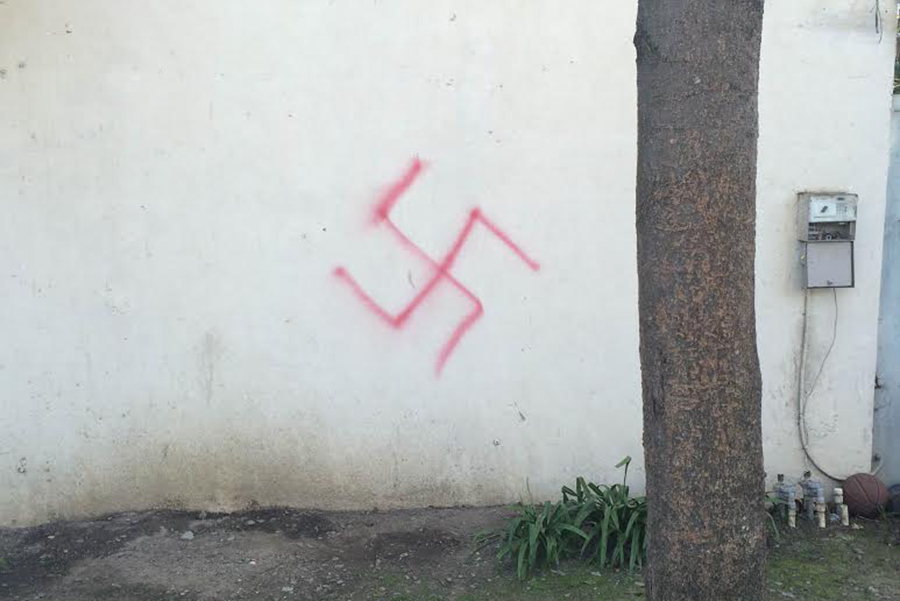
UC Board of Regents issues statement to tackle anti-Semitism on campus
As of 2016, five University of California campuses ranked in the top ten most anti-Semitic universities in the United States.
The study was conducted by AMCHA Initiative in an effort to target the schools that had the most overall anti-Semitism, the highest incidence targeting, the highest incidence of anti-Semitic expression and the highest incidence of Boycott, Divest and Sanction (BDS) activity.
The study went on to say that UC schools had three times the number of anti-Semitic incidents than the average university in the country. In addition, UC Davis landed in all four categories for the most anti-Semitic universities.
This surge in anti-Semitism comes on the heels of the recent passage of ASUCD Senate Resolution (S.R.) #9, which passed on Jan. 29, 2015 with an 8-2-2 vote. The resolution called for the UC Board of Regents to divest from “corporations that aid in the Israeli occupation of Palestine and illegal settlements in Palestinian territories, violating both international humanitarian law and international human rights.”
Shortly after the passage of this resolution, two anti-Semitic incidents that occurred at UC Davis.
The passage of S.R. #9 is one of many across universities all over the country in support of the BDS movement against Israel. The BDS movement at UC Davis has been endorsed by groups such as Students for Justice in Palestine, Jewish Students for Peace and Davis Stands with Ferguson.
A few months ago, in Oct. 2015, the three groups mentioned above held a demonstration at the quad to commemorate the 1953 Qibya massacre.
Kyla Burke, a fifth-year environmental science major and central organizer of Davis Stands with Ferguson, was one of the students who attended the demonstration.
“Personally, what I spoke about that day was the connection between and the similarities between the Palestinian struggle and the Black American struggle, living in systems of oppression. There are some similarities, but that’s mainly what I spoke about — standing in solidarity for each other,” Burke said at the demonstration.
AMCHA Initiative claims that the increase of anti-Semitic incidents and anti-Semitism as a whole are directly correlated with the promotion of the BDS movement and the denigration and delegitimization of the Jewish state of Israel or anti-Zionism.
“99 percent of schools with one or more active anti-Zionist groups had one or more incidents of anti-Semitic activity, whereas only 16 percent of schools with no active anti-Zionist student group had incidents of overall anti-Semitic activity,” AMCHA said in their study.
Benjamin Shapiro, a UCLA alumnus, echoed this sentiment and argued during a divestment event at UCLA that BDS was just another word for anti-Semitism.
“I have never been more ashamed to be an alumnus of this university to see this divestment petition be considered at this level. To pretend that this is about occupation. To pretend that this is about peace. To pretend that this is about anything but vile and despicable Jew-hatred is a lie,” Shapiro said in his speech. “For us to sit here and pretend that Israel is somehow on a lower moral plane is a direct manifestation of anti-Semitism. To hold Jews to a different moral standard than any other country or any other group on the face of the earth represents nothing but an age-old and historic hatred for the Jewish people.”
Many world leaders tend to agree with Shapiro’s stance of supporting the state of Israel, including Pope Francis and British Prime Minister David Cameron.
“This is a state, a democracy that is recognized by the United Nations, and I don’t think we should be tolerant of this effort at delegitimization,” Cameron told The Atlantic. “I have a very clear view, which is that if you disagree with the policies of Israel, fine, say so, but that is never a reason to take that out on Jewish communities. We have to be very clear about threats — this is a dangerous line that people keep crossing over, that says that anti-Zionism is a legitimate form of political discourse.”
In response to this rise of anti-Semitism at UCs, the Board of Regents recently adopted a statement condemning anti-Semitism and is the first major university to do so since the push to economically divest from Israel.
“Anti-Semitism, anti-Semitic forms of anti-Zionism and other forms of discrimination have no place at the University of California,” the Board of Regents said in their statement.
According to the New York Times, there has been some protest from pro-Palestine groups on UC campuses, claiming that the UC’s position is forcing them to stay silent about their advocacy for the Palestinian people in addition to being a stifling of free speech.
However, there are many pro-Israel supporters who have found some common ground with anti-Israel and pro-Palestine activists. Eugene Volokh, a law professor at UCLA and supporter of Israel, claims that, while he is pro-Israel and does believe much of anti-Zionism is anti-Semitism, it is wrong of the UC to ban or condemn anti-Zionist speech.
“Whether the Jewish people should have an independent state in Israel is a perfectly legitimate question to discuss,” Volokh wrote in The Washington Post. “Sometimes the answer might be ‘Yes.’ Sometimes it might be ‘No.’ Sometimes the answer might be ‘It depends.’ But there’s no uncontroversial principle on which these questions can be decided. They have to be constantly up for inquiry and debate, especially in places that are set up for inquiry and debate: universities.”
Written by: Sangeetha Ramamurthy – campus@theaggie.org



